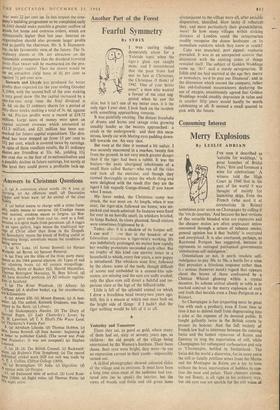Another Part of the Forest
Fearful Symmetry
By STRIX
I WAS casting rather desperately about for a Yuletide topic when the .tiger s glass eye caught mine, and I remembered that the poor brute had met its fate at Christmas, the Christmas (1 think) of 1942. 'One of your better ones?' a man who wanted a favour of me once sug- gested when he saw the
skin; but it isn't one of my better ones, it is the only tiger I ever shot. I look back on the incident with something approaching remorse.
It was painfully exciting. The distant brouhaha of drums and horns and savage cries growing steadily louder as the beaters approached: a crash in the undergrowth ; and then this mon- strous, lovely cat with blazing eyes padding down- hill towards me. An easy shot.
But even at the time it seemed a bit unfair. I was securely ensconced in a machan, twenty feet from the ground, in not very much greater danger than if the tiger had been a rabbit. It was the beaters—the puny aboriginal inhabitants of a small State called Bastar—who ran all the risks and took all the exercise; and though they seemed thoroughly to enjoy the whole thing and were delighted with the result (for they ate the tiger). I felt vaguely Gunga-dinned, if you know what I mean.
My leave ended, the Christmas camp was struck, the war went on. At length,•when it was over, the tiger-skin followed me home, was un- packed and much admired. Its features were fixed for ever in an horrific snarl; its whiskers bristled, its fangs flashed, its claws gleamed: Small visitors were sometimes frightened brit. Today, alas, it is a shadow of its former self.
I can well eve that in the boudoir of an Edwardian temptress a tiger-skin's working life was indefinitely prolonged, no matter how rapidly her wealthy protectors succeeded each other. But no trophy of this kind can survive intact in a household to which, every few years, a new puppy is introduced. The whiskers went first, followed by the claws; some of the teeth, though difficult of access and embedded in a cement-like sub- stance, are missing and the ears are sadly eroded; only the glass eyes still direct a baleful and im- perious stare at the legs of the billiard-table. Little is left of the splendid animal on which I drew a breathless bead twenty-two ,years ago. Still, this is a season at which one must look on the bright side of things: if I hadn't shot the tiger nothing would be left of it at all.
ik
Yesterday and Tomorrow
There they sat, as good as gold, where many of them had sat, sixty or seventy years ago, as children: the old people of the village being entertained by the Women's Institute. Their faces shone, their eyes were bright, they were—to use an expression current in their youth—impeccably turned out.
A skilled photographer showed coloured slides of the village and its environs. It must have been a long time since most of the audience had ven- tured into (so to speak) the interior, but the views of woods and fields and old green lanes circumjacent to the village were all, after amiable disputation, identified. How lucky (I reflected) they, and more particularly their grandchildren, were! In how many villages within striking distance of London could the octogenarian readily recognise the douce landscape on its immediate outskirts which they knew in youth?
Cake was munched, port sipped; euphoria prevailed. It was in an unexpected context that discontent with the existing order of things revealed itself. The subject of Golden Weddings came up. 'Ar!' said a sturdy octogenarian. 'If Edith and me had married at the age they marry at nowadays, we'd be past our Diamond'; and in the discussion which ensued the company, rather like old-fashioned mountaineers deploring the use of oxygen, unanimously agreed. that Golden Weddings would steadily depreciate in value and in another fifty years would hardly be worth celebrating at all. It seemed a small quarrel to pick with the future.




























 Previous page
Previous page